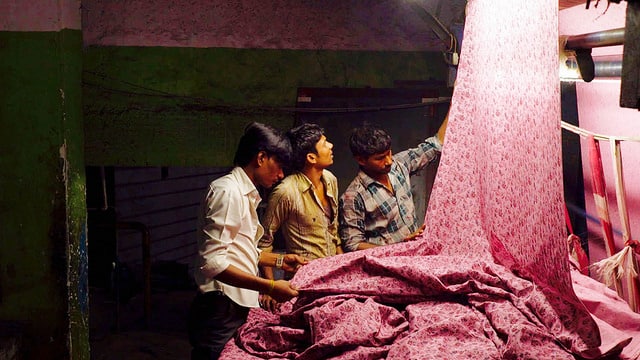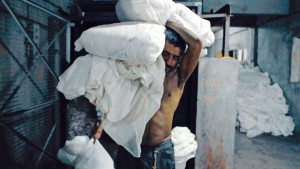
Dir.: Rahul Jain | Documentary | India/Germany/Finland | 75 min.
Originally ‘just’ a midterm project for debuting director/co-editor/co-DoP Rahul Jain at Cal Arts, his ‘student film’ MACHINES found its way into Sundance. Whilst describing the hell of working in a textile plant in Surat, with 4.5 million inhabitants India’s eighth largest city and economical capital of Gujarat, Jain chose to film the hellish environment in an extravagant, visually beautiful style.
Like a flies on the wall, Jain and his crew are invisible: the machines – running for 24 hours – churn out spools of fabric, dyed in sumptuously imaginative patterns, as young children, teenagers and older workers shuffle around their twelve hour shifts, looking like hunted animals in the dark sweltering jungle of this material world. “There are machines and then there are humans that are machines. My main focus was on humans who have ben dehumanised by labour to the point of losing their identities”.
Workers are aware of the trap they find themselves in: “Nobody makes me to work here, I travel 1600 km, 36 hours to get to this place”. Whilst they can stop working at any time, there is no guarantee that they will be re-employed. This is underlined by the sadly astonishing fact that all those interviewed, apart from the managers, had been replaced by the end of the shoot. Only 95% of the state’s workplaces are unionised and more than one labourer states, “When we unite, the leader of the union is usually killed”. Health and security issues are ignored, considering the huge cascades of chemicals and sludge-dumping, one wonders about the long-term health issues of the workforce. At one point, the director is directly questioned about his intentions – and he is compared, not favourably, to politicians who engage with the workers ‘ plight at election times, but disappear quickly after polling day. The textile plant looks like a re-incarnation of a Dickensian nightmare, yet it has been in operation for just twelve years.
 Since the 1960, India has undergone a massive, unregulated industrialisation. In the textile industry alone, 45 million workers are employed, just under a third of which are children. Overtime work means a working week of 70 to 80 hours, the weekly wage is between $US 90 and $US150 a month in an industry with a turnover of $US 40 billion.
Since the 1960, India has undergone a massive, unregulated industrialisation. In the textile industry alone, 45 million workers are employed, just under a third of which are children. Overtime work means a working week of 70 to 80 hours, the weekly wage is between $US 90 and $US150 a month in an industry with a turnover of $US 40 billion.
When asked, why he made such an aesthetically beautiful film of a nightmarish situation, Jain is adamant that “if it weren’t so beautiful, it would be easy to look away. There is something that you cannot ignore about beauty. I wanted the audience to be hypnotised and lulled defencelessly into submission when the images enter their brains”.
Helped by a sound design team led by Susmit ‘Bob’ Nath, MACHINES is a cacophony of noises, where the camera prowls in search of human life, a life with which fades in front of our eyes. The mainstream media is afraid of humans becoming more and more like computers, and Jain pictures an atavistic battle field where workers are left with just one, somehow medieval hope: “My only satisfaction is that everyone dies. Even when the rich go, they leave the world with nothing”. AS
MACHINES IN ON RELEASE FROM 19 MAY 2017 | SUNDANCE WORLD DOC WINNER 2017